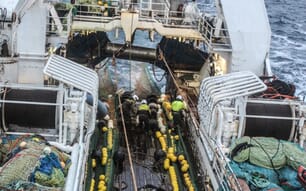The Council was very compressed in time and the early information flow was sparse, limiting discussion and raising the pressure on negotiation.
The Member State team including the Scottish government were forced to revert to almost street fighting tactics to secure the best outcome on the limited number of fishing opportunities that were open to change.
Most Scottish priorities were met: a proposed 15% reduction in monkfish quota on the West coast was reduced to two per cent; a flat prospect for megrim turned into a 10 per cent increase in the West and five per cent in the North Sea.
Fifty per cent proposed reductions for West Coast cod and whiting were reduced to 25 per cent each. There was, however, no change on the original proposed reduction for West coast haddock, which remained at minus 25 per cent.
The Scottish fishermen say there was also no progress on West coast prawns - the mainstay catch for the bulk of the fishing fleet in this part of Scotland - which were cut by 15 per cent.
Reductions agreed at previous international talks were rubber-stamped this morning. These include North Sea haddock, which was cut by five per cent and cod reduced by 20 per cent.
However, the North Sea prawn quota was cut by five per cent - a slight improvement on the original 8% reduction proposal. There were a few other elements of good news, including an increase in North Sea whiting of 15 per cent and rise in the herring quota of 21 per cent.
There will be the provision for fishermen to catch extra cod in the North Sea equal to 12 per cent of the reduced TAC (total allowable catch) if they participate in the ‘catch quota’ scheme, where boats land all the cod they catch but stop fishing once their allocation of that species has been reached. It is estimated that between 35 and 40 Scottish whitefish boats will be eligible to participate in the scheme next year, which while up from 2010, still leaves around 75 whitefish vessels and the whole prawn fleet of over 200 vessels outside the scheme.
Bertie Armstrong, chief executive of the Scottish Fishermen’s Federation, said: “Despite some good negotiating successes, for which the Scottish government team is congratulated, the conclusion of the EU Fish Council has resulted inevitably in a sombre picture for the Scottish fleet with further overall losses in fishing opportunity, particularly on the West coast of Scotland.
“The Scottish fleet has been at the forefront of conservation by innovating and spearheading a number of initiatives such as closed areas and new types of selective fishing gear.
“A lot of our difficulties stem from the regulations and management measures failing to fit the conditions in which the Scottish fleets work. There will be some very significant revisions in 2011 - the cod management plan and new arrangements proposed under the review of the Common Fisheries Policy. It is essential that these opportunities are seized by the industry and government working together to ensure the introduction of a more effective management regime that enables increased input from the fishing industry and greater regional control.
“Such change would help secure both the future of our fish stocks and our valuable fishing industry.”
Meanwhile, the SFF has welcomed the signal of intent given by European Fisheries Commissioner Maria Damanaki to impose sanctions on Iceland and the Faroes on the trade of fish because of their decision to set their own unilateral mackerel quotas outwith the bounds of an international coastal states management agreement.
Bertie Armstrong said: “We welcome this stance taken by the Commission. Mackerel is an incredibly important fishery to Scotland, which requires responsible management to ensure sustainable harvesting.
“Iceland and the Faroes must not be allowed to get away with their irresponsible actions and it will serve as a warning to other nations around the world of the importance of the sensible and sustainable management of our precious global fish stocks.”
Scottish Fleet Calls for Fisheries Change
UK - Following the conclusion of the EU Fish Council, which has resulted in some further cuts in the catching opportunity for the Scottish fleet, the Scottish Fishermens Federation is calling for urgent progress in 2011 in the way that our fisheries are managed.




